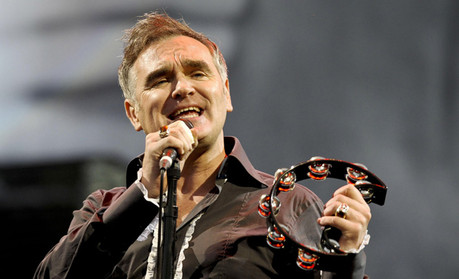
Morrissey's case against NME's publisher and former editor will be heard by a jury next year.
Credit: Ben Birchall/PAMorrissey's libel suit against NME magazine, over a controversial interview that the singer claims portrayed him as a racist, will be heard by a jury next year, the high court ruled this morning.
The former Smiths frontman is suing both the magazine's publisher IPC Media and then-editor Conor McNicolas over the 2007 piece, titled "Morrissey Big Mouth Strikes Again".
Morrissey claimed in his submission to the court that his interview with the magazine had been "deliberately distorted, by misrepresentation and omission, to create the maximum publicity for the interview, and to promote the campaign 'Love Music Hate Racism' espoused by NME". Morrissey also cited seven other articles published in the wake of the NME piece, by the Guardian, Independent, Sun, Times, Evening Standard and Sunday Times, which he claimed "exemplified the sensation" caused by NME.
In a written judgment, Mr Justice Tugendhat said that the "imputation" in the NME article was "a very serious one".
"Overall, in my judgment a proper balance between the Article 10 right of freedom of expression of the defendants and Mr Morrissey’s right to the protection of his individual reputation requires, in the circumstances of this case, that the action be permitted to proceed."
Tugendhat also dismissed a bid by McNicolas and IPC Media to strike out Morrissey's claim on the grounds that it had come four years after the article was published. The judge ruled that the point at which it was no longer possible to have a fair trial had not yet been reached, and that it was "not possible for me to disbelieve Mr Morrissey’s explanation as to why he did not pursue the action after May 2008".
"His explanation is credible. I cannot infer that he ceased to have an intention to progress the action to trial, or that he has been abusing the process of the court by failing to progress it to trial. He ought, of course, to have progressed the action, but to strike out the action would be a disproportionate sanction for this breach of the civil procedure rules."
Both McNicolas and Tim Jonze, who conducted the interview with Morrissey and wrote the first draft of it, voiced concerns to the court over the length of time since the piece was published. McNicolas said in his witness statement that he was "very concerned about the prospect of having to give evidence at a trial more than four years after the events in question". If the case does go to court next year, Jonze, who is now music editor at the Guardian, and Krissi Murison-Hodge, then deputy editor at NME and now editor, will likely give evidence.
The case will be the first libel case to go before a jury in the UK for more than two years, since Richard Desmond, whose Northern & Shell publishing company, which owns the Daily Express, lost a suit against author Tom Bowyer.
The singer's lawyers indicated earlier this month that he would appear in court to be cross-examined if the case went before a jury.
In a written statement issued by his solicitor after the hearing, Morrissey said: "In 2007 the NME viciously attacked me and labeled me a racist and a hypocrite.
"Last week they sought to avoid facing me in court to settle the matter once and for all.
"I am delighted that the NME's attempt to stifle my claim was unsuccessful and that as a result I will be able to use the very public forum of the high court in London to clear my name, loud and clear for all to hear."
An NME spokeswoman said: "NME recently sought to strike out Morrissey's claim on grounds of a lengthy delay. After almost four years, we are glad that the matter will now proceed to trial and we will finally get the opportunity to bring this matter to a close."
Tugendhat said that it appeared to him that the case "might be susceptible" to an out of court settlement before it goes to jury.
Free daily newsletter
If you like our news and feature articles, you can sign up to receive our free daily (Mon-Fri) email newsletter (mobile friendly).
Related articles
- What does GDPR mean for journalists?
- The key role slow journalism plays in the 24/7 digital news cycle
- German publishers are concerned the EU's ePrivacy Regulation is putting their digital advertising revenue at risk, study finds
- Future offers free digital editions with print in September
- Times Newspapers ordered to pay £60k damages in article update dispute











